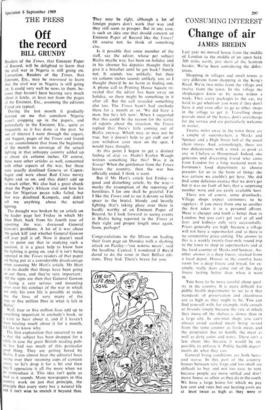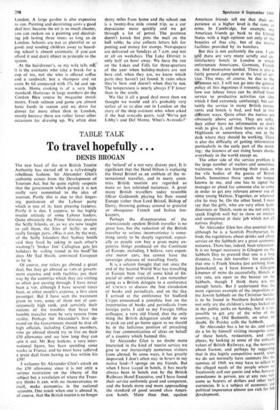CONSUMING INTEREST
Change of air
JAMES BREDIN
Last year we moved house from the middle of London to the middle of an open field, 300 miles north, just short of the Scottish border. We've been considering the differ- ences.
Shopping in villages and small towns is very different from shopping in the King's Road. We're two miles from the village and twelve from the town. In the village the shopkeepers knew us by name within a week. They carry packages to the car, try hard to get whatever you want if they don't have it and even otter to go to other shops in the village to get it. Travelling shops provide most of the basics, don't overcharge for the service and are particularly welcome in winter.
Twelve miles away in the town there are a couple of supermarkets, a Marks and Spencer and a High Street full of the usual chain stores. And, astonishingly, there are two delicatessens with a stock as good as any in Chelsea or Hampstead. Indeed, one generous and discerning friend who came from London for a long weekend went to Fortnum's food department to choose presents for us in the form of things she was certain we couldn't get here. She did find some delicious exotica that we don't get but it was no fault of hers that a surprising number were and are easily available here. There are, of course, some drawbacks. Village shops expect customers to be regulars: if you move from one to another the first takes it as a personal affront. Meat is cheaper and lamb is better than in London, but you can't get veal at all and liver and kidneys only very occasionally. Prices generally are high, because a village will not have a supermarket and so there is no competitive price cutting. The answer to this is a weekly twenty-four-mile round trip to the town to shop in supermarkets and at the food counter of Marks and Spencer. An- other answer is a deep freeze, stocked from a local depot. Houses in the country have room for a deep freeze and bread, for ex- ample, really does come out of the deep freeze tasting better than when it went in.
You have to be more careful about qual- ity in the country. It is more difficult for public health departments to sec to it that standards of preservation and cleanliness are as high as they ought to be. You can find yourself with, for example, stale cereals or biscuits simply because the rate at which they move off the shelves is slower than in a large city. In one-man shops you can't always avoid cooked meats being served from the same counter as fresh meats and the proprietor has to handle the meat as well as dirty coins and notes. There isn't a law about this because it would be im. possible to enforce it. Public health depart ments do what they can. General living conditions are both befit:: and worse. In this part of the country houses between very large and too small are difficult to buy and not too easy to rent. because people are more settled and don't move house as often as they do in the south. We have a large house for which we pay low rent and rates but our heating costs are at least twice as high as they were in
London. A large garden is also expensive to run. Painting and decorating costs a good deal less; because the air is so much cleaner, you can reckon on a painting and decdrat- ing job lasting three times as long as -in London. Schools are not as plentiful or as good, and sending children away to board- ing school is almost axiomatic, if youV,can afford it and don't object in principle to the system.
At the hairdresser's, so my wife tells tittit it is the assistants who take a break for a cup of tea, not she who is offered coffee and a sandwich; but a shampoo and set costs 8s 6d compared with 17s 6d and up- wards. Home cooking is of a very high standard. Hostesses in large numbers do the Cordon Bleu course by magazine instal- ments. Fresh salmon and game are almost basic foods in season and we dress for dinner far more often than in London, mostly because there are rather fewer other occasions for dressing up. We often dine
thirty miles from home and the school run is a twenty-five mile round trip, so a car depreciates more quickly and we get through a lot of petrol. The postman doesn't knock but puts the mail on the hall table; he also collects letters left for posting and money for stamps. Newspapers are delivered on Sundays at 7 a.m. and not at all on weekdays. The Lake District is only half an hour away. We have the run on the Lakes and Fells for three-quarters of the year when holiday-makers are not here and, when they are, we know which parts they haven't yet found. It rains when they're here and doesn't when they're not. The temperature is nearly always 5°F lower than in the south.
We like it all a good deal more than we thought we would and it's probably very unfair of us to dine out in London on the story of the shop assistant who, when asked if she had avocado pears, said 'We've got Libby's and Del Monte. What's Avocado?'



































 Previous page
Previous page